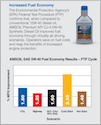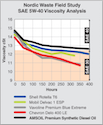|
"What do you know about the oil in your car's engine? From the ads, you're led to believe the most exotic part of a Ferrari's engine is in the sump," writes Fast Fours and Rotaries (FFR) (July 1998), an Australian performance car journal. The basic concept of oil is to provide a film of lubrication between two surfaces," FFR continues, "reducing friction, wear and heat and ensuring an engine's long life span. But the reality is that while all claim to be superior, there are some that are better than others. We decided to test most of the major brands to see how the well-known brands, the ones most of us can readily buy, shape up in a real-life engine test."
FFR chose to test only high quality synthetic oils. High quality synthetics are each oil makers' top product and high quality synthetics are "most relevant" to performance enthusiasts. The testers ran each oil through a "short yet grueling" dynamometer session followed by professional oil analysis. Sam Blumenstein, of COME Racing, performed the dyno testing on his Super Flow engine dynamometer using a mildly modified five liter V8. Bill Reid, of Lubrication Management, performed the oil analyses. Ryco supplied oil filters. After establishing baseline performance using a mineral oil, the test team subjected the test oils to three timed sessions at high engine loads, between each of which were three full-power runs. "The intent," says FFR, "was to establish a number of criteria. Firstly, whether any of the oils would improve horsepower; whether any of the products would lose viscosity; evaluate (the) ability (or lack thereof) to prematurely wear components or suffer from discoloration. As it turned out, discoloration didn't prove to be a factor. We approached ten oil suppliers/manufacturers, informing them of our intention, and all were reasonably keen and eager to be involved, although Pennzoil didn't want to commit and Penrite flat out said no -- a little strange given this company has actually advertised with and for this (performance) market."
FFR first subjected the oils to a test of viscosity retention. "Note," writes FFR, "that being such a short test it was felt that none of the oils would lose any of its viscosity rating, and indeed six oils suffered an inconsequential loss of less than one percent." The other five, Torco MPZ, Shell Helix Ultra, Shell Helix Plus, Hi-Tec HTO and Castrol R suffered significant viscosity losses.
FFR points out that the loss of viscosity suffered by the five oils was very rapid. "Under normal conditions it's suggested oil which loses viscosity this quickly would be subject to significant losses over 5000 miles (8045 kms). Indeed, one would be suspect of the potential for increased wear over this period."
Oils inhibit wear by inhibiting metal to metal contact of engine parts. To test each oil's ability to protect parts from contact and wear, FFR subjected each oil to a test of wear metal generation. Their test "indicates the size and number of wear particles for each oil. The higher the rating (larger number) the greater the number and size of wear particles," writes FFR. AMSOIL Series 2000 Synthetic 20W-50 Racing Oil: Lowest Wear Metal Generation
FFR averaged three runs per oil, noting power figures at 500 rpm increments between 3000 and 5000 rpm and noting peak power and torque. While the engine FFR used for testing was a large tolerance engine for which a 20W-50 grade oil is ideal, some of the oil manufacturers supplied 0W-30 grade oils for testing. The low grade viscosity oils delivered somewhat greater horsepower than the high grade oils did, but as FFR notes, "around 4000 rpm the power produced is very similar across the range, and it's only really at the top end where there are substantial differences. That said, the AMSOIL (20W-50), Castrol R (10W-60) and Mobil 5W-50 prove themselves very well."
"With the variety of grades, use this test as a guide but always follow the manufacturers recommendation. But if we were to stick our neck out in the anticipation of the law suits, from the information we gathered specific to the supplied oils in this test, we'd rate the oils in the following order: #1 AMSOIL
|
 Las Vegas Taxi Cab Field Study
Las Vegas Taxi Cab Field Study Motor Oil Comparison 2013
Motor Oil Comparison 2013 Diesel Fleet Fuel Economy Study in
Diesel Fleet Fuel Economy Study in Marine E-TEC Field Study (G2968) (1.2 MB PDF) AMSOIL HP Marine Synthetic 2-Stroke Oil prevented piston skirt scuffing and cylinder bore scuffing in a 250-hp Evinrude E-TEC marine engine during more than 500 hours of real-world use at the engine's lean-mix oil setting.
Marine E-TEC Field Study (G2968) (1.2 MB PDF) AMSOIL HP Marine Synthetic 2-Stroke Oil prevented piston skirt scuffing and cylinder bore scuffing in a 250-hp Evinrude E-TEC marine engine during more than 500 hours of real-world use at the engine's lean-mix oil setting.  A Study of INTERCEPTOR® Synthetic 2-Stroke Oil
A Study of INTERCEPTOR® Synthetic 2-Stroke Oil 3,469-Mile Case Study in Rotax E-TEC Engine (G3038) (1.1 MB PDF) AMSOIL submitted the pistons from a Ski-Doo Rotax E-TEC 800R engine to an ASTM-calibrated rater following 3,469 miles of aggressive trail riding to reveal that AMSOIL INTERCEPTOR® Synthetic 2-Stroke Oil provided outstanding protection and prevented piston skirt
scuffing and ring sticking.
3,469-Mile Case Study in Rotax E-TEC Engine (G3038) (1.1 MB PDF) AMSOIL submitted the pistons from a Ski-Doo Rotax E-TEC 800R engine to an ASTM-calibrated rater following 3,469 miles of aggressive trail riding to reveal that AMSOIL INTERCEPTOR® Synthetic 2-Stroke Oil provided outstanding protection and prevented piston skirt
scuffing and ring sticking.  AMSOIL Premium API CJ-4 5W-40
AMSOIL Premium API CJ-4 5W-40 AMSOIL Premium API CJ-4 5W-40
AMSOIL Premium API CJ-4 5W-40 AMSOIL Premium API CJ-4 5W-40
AMSOIL Premium API CJ-4 5W-40 Diesel Recovery Cold Filter Plugging Point (794k PDF) Cold Filter-Plugging Point (CFPP) testing shows AMSOIL Diesel Recovery (DRC) lowers the cold filter-plugging point of diesel fuel more effectively than the competing brand. Note: All additives were available to consumers at the
time of testing. Testing completed August 2009. Test results do not reflect future formulation changes.
Diesel Recovery Cold Filter Plugging Point (794k PDF) Cold Filter-Plugging Point (CFPP) testing shows AMSOIL Diesel Recovery (DRC) lowers the cold filter-plugging point of diesel fuel more effectively than the competing brand. Note: All additives were available to consumers at the
time of testing. Testing completed August 2009. Test results do not reflect future formulation changes.  Diesel Fleet Fuel Economy Study (G2904) Testing completed in compliance with the industry-standard SAE J1321 In-Service Fuel Consumption Test Procedure demonstrates use of AMSOIL synthetic lubricants can increase fuel economy in short- to medium-haul diesel applications and, in this case, did by 6.54 percent.
Diesel Fleet Fuel Economy Study (G2904) Testing completed in compliance with the industry-standard SAE J1321 In-Service Fuel Consumption Test Procedure demonstrates use of AMSOIL synthetic lubricants can increase fuel economy in short- to medium-haul diesel applications and, in this case, did by 6.54 percent. 
 Canada
Canada United States
United States